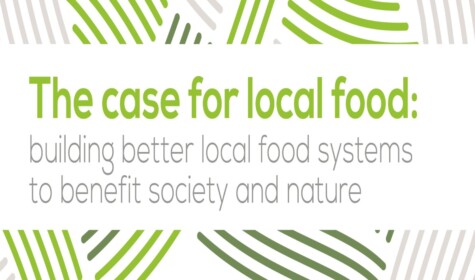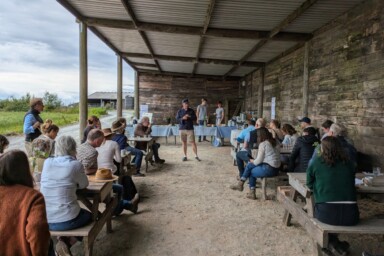A shift of 10% of the retail market share for sustainable, local food businesses could create an additional 200,000 jobs, support a green economic recovery and restore nature, a new report published this week by RSPB and Sustain has found.
The report authors are calling on the Government to use its post-Brexit investment funds to fill local food infrastructure gaps as evidence shows producers and customers in local food systems are motivated by environmental benefits and production is associated with agroecological, nature-friendly methods.
‘The Case for Local Food’ comes ahead of the anticipated National Food Strategy which is expected to make recommendations on food production. The new report argues that government support to plug infrastructure gaps could help local food businesses access £2bn of national and local food procurement contracts and help the National Advisory Board for Dynamic Food Procurement meet its aim to divert over 33% of UK public sector food and drink spend to fresh, local produce from sustainable SME producers by 2025.
The report defines local food as food that is produced within a short distance of where it is consumed, often accompanied by a social structure and supply chain different from the large-scale supermarket system (eg co-ops, box schemes, markets).
Local food systems allow for a larger proportion of revenues to be retained in the local economy; every £10 spent with the box scheme results in total spending of £25 in the local area, compared with just £14 when the same amount is spent in a supermarket. A shift to more localised food systems would help level up the country with every part of the UK having the potential to benefit.
Ben Reynolds, Deputy Chief Executive of Sustain, the food and farming alliance said:
“UK farmers, food producers and the public could all benefit by increased opportunities to buy local food if the Government acts now and invests in the much-needed infrastructure and commits to policies that drive change. One in seven jobs in this country is in food and farming, so it deserves the support it needs to thrive.”
Lucy Bjorck, Senior Policy Advisor at the RSPB said:
“By shifting more of our food retail to local, nature-friendly sources, the Government could help restore nature to the countryside and tackle climate change. A thriving local food economy supports diverse farming systems which bring benefits for nature by sustaining a diversity of habitats and management. By offering produce with lower production emissions local food systems can cut our carbon footprint, reconnect people with seasonal eating and reduce waste.”
The key recommendations are:
- A 10% shift in the food retail market towards more sustainable local food systems could yield up to 200,000 more jobs, support a green economic recovery and restore nature.
- A new Local Food Infrastructure Fund is needed by Government to provide strategic support for local, nature-friendly and agroecological food production.
- This could make it easier for small, sustainable businesses to access £2bn of national and local food procurement contracts.
- Every local authority area in the UK should be served by a food partnership by 2025.
Potential benefits of supporting sustainable, local food systems identified by the authors include:
- Creating more nature friendly landscape: Local food systems encourage a diversity of production systems, which means they provide more opportunities for wildlife. A recent survey of veg box schemes found that the majority (67%) of 101 respondents were small-scale producers, regularly supplying up to 300 veg boxes per week to local communities, and that most of these were organic, which has benefits for soils and nature.
- Boosting farm businesses and local economies: Farm shops and farmers’ markets provide a valuable opportunity for farm businesses to diversify and to add value to their production helping them improve their profitability. This can help provider better paid employment and opportunities for investment in skills development.
- Reducing waste in the food system: The long supply chain model results in food loss estimated at between 3% and 10%. Research suggests that farm-level waste due to cosmetic standards is about 7.4%, though much higher for some crops, and overall waste thanks to supermarket demands for overproduction are 10–16%. Sourcing locally can help reduce this waste.
- A more climate friendly food system: Air-freighted produce comes with a colossal carbon footprint. In the UK, 70% of the beans, peas and asparagus in our supermarkets are air-freighted. By comparison a study of 228 box schemes across four countries (including 147 from the UK) found that 41% boxes used produce from their own farms and 76% within 100km.
The report and a full list of recommendations is available to download.






